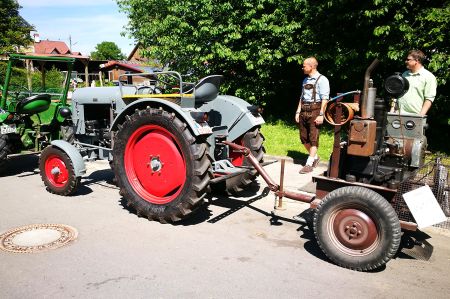950 years Anhausen - tractors in the center of celebrations
- Written by Portal Editor
After the first written mentioning of the town Anhausen in the year 1067, the celebrations for the 950th birthday of the place took place, which Lydia and Georg offered us during our stay as a short-trip destination.
The citizen Volcmar de Anneshusa was at that time the witness of the donation certificate of the Augsburg Bishop Embrico to the Kollegiatsstift St. Peter (at the Perlach Tower) in Augsburg. The village was probably founded in the 6th to 7th century already when the Alemanne Anno founded a settlement with his and two other families south of Diedorf in a side valley of the Schmutter, which from then on was called Annohuson, Anneshusa and finally called Anhausen.
The town of Anhausen has about 1400 inhabitants and is located a few kilometers southwest of Augsburg at an altitude of 517 meters on the edge of the Anhauser valley. The Anhauser valley stretches about 6.5 kilometers in the north-south direction. The path through the valley is closed to traffic and therefore is very popular with hikers and cyclists.
Three signposted cycle tours and two long-distance hiking trails lead through Anhausen and the Anhauser valley:
• Cycling tour "Schwäbischer Mozartwinkel" (46 km)
• cycling tour "Waldidyllen" (49 km)
• Cycling trail "Freiherr von Zech"
• Long Distance Trail Augsburg-Sonthofen
• The Way of St. James
In addition to some Nordic Walking round trips, the Trimm-Dich path and the cross-country trail, there is also a so-called beaver tour in Anhausen:
Since about 1990 and again 2005, a beaver family has settled at the Anhauser Creek and several dams have been built. You can follow the beaver dams and their traces along the stream.
A legend about the founding of the monastery of Oberschönenfeld is still circulating in the village:
Count Mangold, who lived on a castle in Anhausen, lost his way during the hunt in the forest. In the wilderness he met a hermit, who lived in a wooden cavern. In an conversation, he learned that the hermit had been a dead ancestor of him who wanted to repent in solitude for his sins. After the death of the hermit, the Count had erected a chapel at the place of the wooden cavern. Later two noble chamber maids entered there and finally founded the Cloister Oberschönenfeld.
At the field we were "well-come" by farming machines and tractors, which immediately aroused our interest. The local fire brigade also participated in the presentations with various vehicles, which could quite well be taken into a museum. Further information were given to the development of the town in form of picture galleries, which also strongly dealt with the rural life of the past. Of course, the Beer-Tent was not missing, so the physical well-being was taken care of too.
Please read as well:
A day trip to Volos to explore the Pilion Railway
Looks of Love at the Hohenzollern Bridge at Cologne
-
 Anhausen - 950 years celebration
Anhausen - 950 years celebration
Anhausen - 950 years celebration
Anhausen - 950 years celebration
-
 Anhausen - 950 years celebration
Anhausen - 950 years celebration
Anhausen - 950 years celebration
Anhausen - 950 years celebration
-
 Anhausen - 950 years celebration
Anhausen - 950 years celebration
Anhausen - 950 years celebration
Anhausen - 950 years celebration
-
 Anhausen - 950 years celebration
Anhausen - 950 years celebration
Anhausen - 950 years celebration
Anhausen - 950 years celebration
-
 Anhausen - 950 years celebration
Anhausen - 950 years celebration
Anhausen - 950 years celebration
Anhausen - 950 years celebration
-
 Anhausen - 950 years celebration
Anhausen - 950 years celebration
Anhausen - 950 years celebration
Anhausen - 950 years celebration
-
 Anhausen - 950 years celebration
Anhausen - 950 years celebration
Anhausen - 950 years celebration
Anhausen - 950 years celebration
-
 Anhausen - 950 years celebration
Anhausen - 950 years celebration
Anhausen - 950 years celebration
Anhausen - 950 years celebration
-
 Anhausen - 950 years celebration
Anhausen - 950 years celebration
Anhausen - 950 years celebration
Anhausen - 950 years celebration
-
 Anhausen - 950 years celebration
Anhausen - 950 years celebration
Anhausen - 950 years celebration
Anhausen - 950 years celebration
-
 Anhausen - 950 years celebration
Anhausen - 950 years celebration
Anhausen - 950 years celebration
Anhausen - 950 years celebration
-
 Anhausen - 950 years celebration
Anhausen - 950 years celebration
Anhausen - 950 years celebration
Anhausen - 950 years celebration
-
 Anhausen - 950 years celebration
Anhausen - 950 years celebration
Anhausen - 950 years celebration
Anhausen - 950 years celebration
-
 Anhausen - 950 years celebration
Anhausen - 950 years celebration
Anhausen - 950 years celebration
Anhausen - 950 years celebration
-
 Anhausen - 950 years celebration
Anhausen - 950 years celebration
Anhausen - 950 years celebration
Anhausen - 950 years celebration
-
 Anhausen - 950 years celebration
Anhausen - 950 years celebration
Anhausen - 950 years celebration
Anhausen - 950 years celebration
-
 Anhausen - 950 years celebration
Anhausen - 950 years celebration
Anhausen - 950 years celebration
Anhausen - 950 years celebration
-
 Anhausen - 950 years celebration
Anhausen - 950 years celebration
Anhausen - 950 years celebration
Anhausen - 950 years celebration

